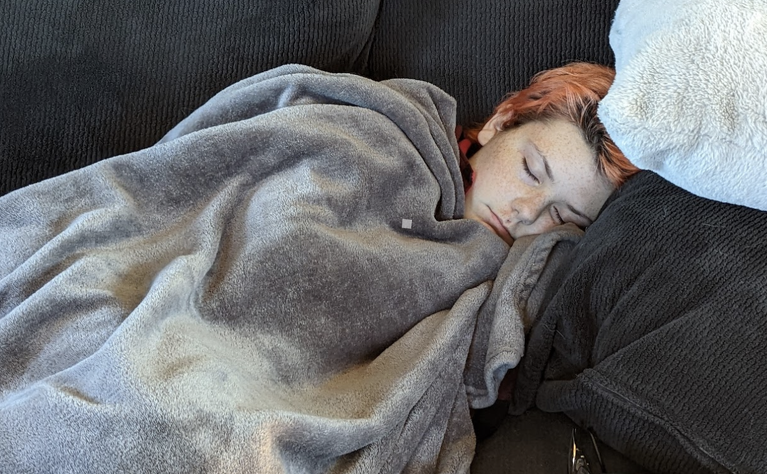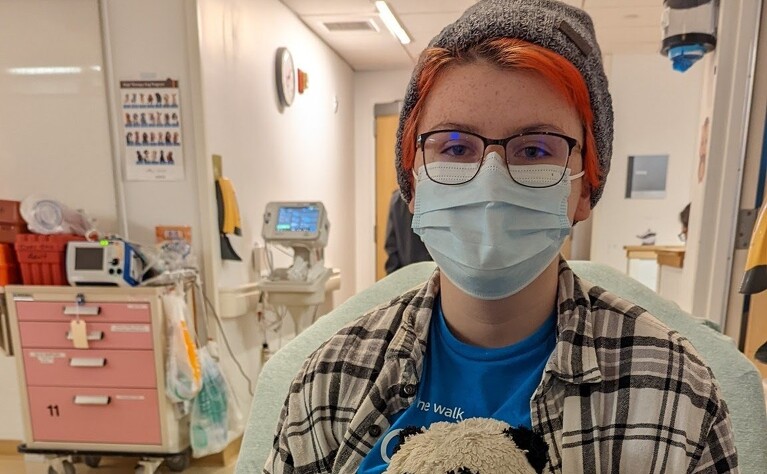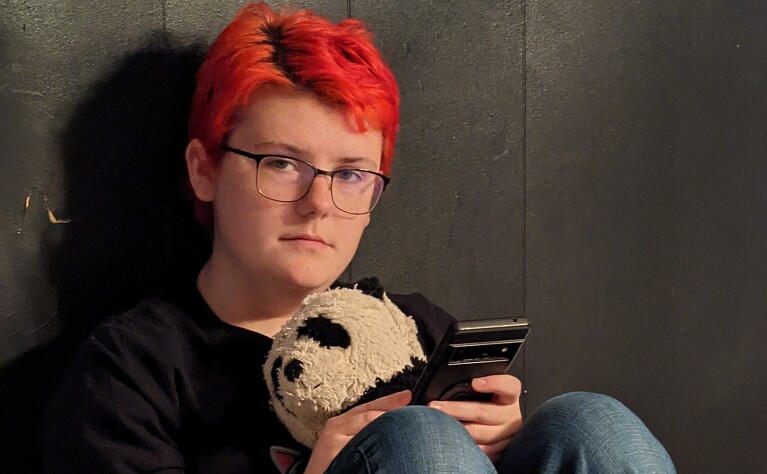Name: Grace Farr
Year of Birth 2007
Lives: Auburn, United States
Type of IBD: Ulcerative colitis (pancolitis)
Diagnosis Date: 2022
Symptoms at Diagnosis: Abdominal pain, lack of appetite, nausea, bloody stools, more frequent and urgent stools, joint pain, fatigue, weight loss.
Details of Surgery: N/A
I’ve always had a sensitive stomach and the first time I remember having severe abdominal pain was a week in January 2022, but my symptoms didn’t get concerning until October 2022, when I got so sick it started affecting every aspect of my life. I was in excruciating abdominal pain. I couldn’t eat nearly as much because of nausea and the pain, so I was losing weight quickly. My joint pain was bad and I was having six loose, often bloody, and urgent bowel movements a day. Then, my mental health plummeted.

Before the blood appeared, I went to the ER. I felt horrible physically and I was terrified to go to the ER again (I had gone earlier that year for a different reason) but a triage nurse said I needed to. There, they did blood work (which my mom had to request) and said I might have inflammatory bowel disease (IBD), irritable bowel syndrome (IBS), celiac disease, a virus, or a food intolerance, and sent me home. A couple days later, the bleeding started, and my other symptoms got worse. I was stuck on the sofa a lot and I didn’t know how to function. I don’t remember much of how I felt then, and a lot of the memories are blurred, but I know my whole world was turned upside down.
My PCP (primary care physician) referred me to a gastroenterologist (GI) near me. They didn’t have appointments for weeks or a month. I couldn’t wait that long, so my mom called Boston Children’s Hospital, and they got me to see a GI within the day. The GI was concerned, especially about the blood and weight loss, so she scheduled a colonoscopy and endoscopy, thinking I either had a bad virus or IBD. I had a few calprotectin tests, all with high results, which made my doctors (and me) more concerned.

About two months later, I was feeling a lot better, but I still had symptoms and a high calprotectin so we went through with the colonoscopy and endoscopy. They found ulcers in my large intestine, and a couple weeks later my biopsy results confirmed ulcerative colitis (UC), specifically pancolitis. This means my entire colon/large intestine is affected, but I didn’t know that until more recently.
“I felt really scared when I first got diagnosed.”
I felt really scared when I first got diagnosed. I was sitting on the sofa doing math when my mom got my results in the children’s hospital portal. It felt like my world was spinning but somehow stopped at the same time. I wanted answers, but I didn't want to have a condition I was so scared of. I didn’t really know what ulcerative colitis was, but I’d heard people talk about the extreme hardships of IBD.
Following diagnosis, I started on mesalamine, which helped bring my calprotectin down to 81, which is amazing compared to my previous numbers. But I still had plenty of symptoms, so my GI added prednisone, planning to wean me off. My GI hoped it would make the mesalamine work, but I got sick again when I tried to taper. Because of this, I stopped the taper, and I’m switching to Humira (adalimumab) soon. I’m scared because I’ve never done self injections. I'm scared of needles and possible pain. I’m scared I’ll have scary side effects, but I’m hopeful, and I know things can’t stay this way.
IBD affects everything in more ways than I can put into words. One way IBD affects my life, is when I’m in a bad flare, I sometimes have to go to the bathroom very urgently and frequently. When this happens, I’m afraid people will notice. Additionally, in bad flares, I’ve needed to sit out from physical stuff because of the pain from ulcerative colitis. I also have to rest more.
“One of the biggest changes has been my mental health.”
One of the biggest changes has been my mental health. I had medical PTSD before developing ulcerative colitis from years of living with chronic illnesses (AMPS, hypermobility, suspected dysautonomia) and traumatic medical experiences, but it got significantly worse with UC. Before I was diagnosed, I had an abdominal/pelvic ultrasound and it was extremely painful, which I now know was probably partially because of UC. Even though it went much better, I had a liver ultrasound recently (the results were fine) because my bloodwork was off and liver problems are more common with IBD, and the fear I felt before added to the stress I still feel frequently.
My colonoscopy/endoscopy is another event that was way easier than I expected, but the stress leading up to it still affects me today, over three months later. Even my regular virtual GI appointments feel traumatic. Additionally, being diagnosed with a lifelong illness is terrifying. I thought I was prepared for any diagnosis because of my past experiences, but I had no idea what to expect. I couldn’t look into the future and see this great life I had planned anymore, just fear and dread. I still have panic attacks as I fear for my future, but eventually, I started looking to the future with hope again, and I realised that I don’t have to be healthy to be okay.

If I could give any advice to people with IBD, it would be that health should not be the end-all goal in life, because it’s impossible to guarantee that you’ll be healthy. I believe I’ll go into remission someday, and I will fight hard and do everything I can to get there, but unless something changes science-wise I will never be free of all health conditions. To be honest, though, I don’t really want to be. If there’s an IBD cure, I’m sure I’ll take it, but my life would not be my life, and I wouldn't be who I am if I hadn’t gone through everything I have. In the end, acceptance makes IBD a lot easier.
Another piece of advice I would give is to be honest about your struggles. No one can know what you're going through or help you if they don't know. With that, find your people. Find the people who ask how you are when you’re struggling. The people who make you laugh on bad days. Those people might be online friends you met in the chronic illness community, people you’ve known forever, or people you randomly met recently, but it doesn’t matter as long as they’re your people (or animals). Additionally, if you have access to therapy, use it and work through your IBD fears.
“Remember that your IBD diagnosis doesn’t define you. You are so much more than your illness.”
The most important advice I'd like to give my fellow IBD warriors is no matter how hard things get, keep going. Things might feel dark and impossible right now, but I promise you can get through it and brighter days are ahead. Remember that your IBD diagnosis doesn’t define you. You are so much more than your illness. Your life is more than your illness.
If you want to follow along with my health journey, my Instagram handle is @the.amps.journey.